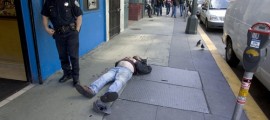Articles Posted in the Politics Category
-
Can California Afford an $11.1 Billion Water Bond?
California now has the lowest credit rating of any state in the nation, just above junk bond status. One major problem is the rise in California’s debt-service ratio (DSR). That is, the ratio of annual general fund debt–service costs to annual general fund revenues and transfers. This is often used as one indicator of the state’s debt burden. The higher it is and more rapidly it rises, the more closely bond raters, financial analysts and investors tend to look at the state’s debt practices, and the more debt–service expenses limit the use of revenues for other programs. According to the California Legislative Analyst’s Office, debt servicing is projected to comprise 9 percent of general fund revenues by the end of 2014-15.
-
Candidates Respond to Daly’s Progressive Primary
Of the twenty-five declared candidates solicited for comment, eleven candidates have responded, expressing a collective thumbs down on the primary. Robert Jordon is the only candidate to express a willingness to endorse the winner of the primary.
-
New Mayor and District Attorney Visit Prog Supes
The first time I met Aaron Peskin, I stood him up. It worked out though. I was supposed to meet him at Wild Awakenings coffee shop on McAllister down the street from City Hall. He’d just been elected to the San Francisco Board of Supervisors and I liked the cut of his jib and wanted to interview him, but I got delayed at a press conference where Jim Reid was announcing the filing of his papers to recall Mayor Willie Brown. It was January 2001. Luckily I ran into Aaron on the sidewalk as I hurried tardily to our meeting. We talked about Willie Brown and how I wanted him gone. Peskin told me off-the-books that he wanted Willie gone too.
-
Minding Muni, Part V
All over the country, public transportation systems are cutting back service under the weight of huge budget deficits. Most people think these agencies are casualties of the recession, and to certain extent they are probably right. But to me, these agencies and their ballooning deficits are something else also — they are canaries in the coal mine, indications of problems that go deeper than even the subprime loan fiasco that many are blaming for the current state of the economy. Collapsing transit agencies are signs that the anti-tax mania of the last few decades is a failure. They are also signs that our western lifestyle — dependent as it is on plentiful and cheap natural resources, especially fossil fuels — could be reaching its limits and going into decline as demand now begins to outstrip supply.
-
Media Alert: SF Sit/Lie Ordinance to Get Third Airing
“When pressed by Supervisor Campos, neither the Mayor’s office nor the police could cite any language in the existing laws or in the SFPD General Orders that prevent the police from enforcing those laws to address problem behaviors on sidewalks. If proponents cannot provide an explanation for why this new ordinance is needed, then it is clear we should not pass sit-lie into law,” said Andy Blue of the Stand Against Sit Lie Coalition.
-
Newsom Lashes Out at Board,
Transportation Workers Union“There is no more time for political theatrics,” Newsom wrote in terse statement released to the press. “The moment to step up is now. The Board of Supervisors has said repeatedly said no. TWU has repeatedly said no. But now it’s time for them to say yes. It’s time for the Board of Supervisors and TWU to say yes to restoring service, to say yes to keeping our buses running, and to say yes to reaffirming our commitment to a Transit First city.”
-
Keys Wins Hungry Hearts During D6 Candidates Forum
Billed as “Neighborhood Silver Tsunami 2010,” the ‘meet the candidates’ forum was hosted by several organizations dedicated to improving the lives of senior citizens including The Coalition of Agencies Serving the Elderly, SF Veterans Equity Center Planning for Elders, Senior Action Network, SOMCAN, Open House, Seniors Organizing Seniors and Episcopal Community Services-Canon Kip Senior Center.







 The Hunger Site
The Hunger Site
Recent Comments